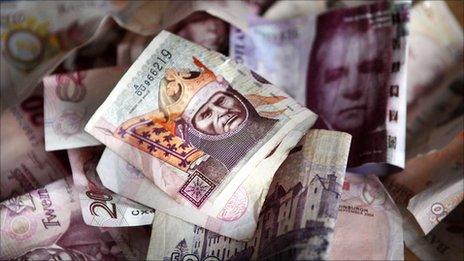Paying with a flexible friend
- Published
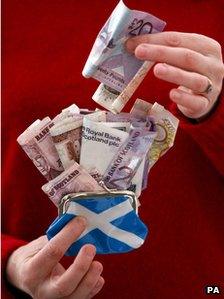
Decisions on currency would have to be made soon after a referendum
If Scotland's to become independent, how would you like to pay for that? Pounds, euros or a Scottish currency?
Or how about simply using a credit card - the kind that used to be advertised, under the deceased Access brand, as 'your flexible friend'?
The key question: who's required to be flexible here? The Treasury in London, the European Central Bank, the bond markets or an independent Scotland's finance secretary?
This is not the first time this year that the question of currency has featured in the referendum debate. And you can be fairly sure it won't be the last time before decision day in autumn 2014.
With such a long campaign, the weak spots in both sides' arguments will keep coming back, and keep coming under pressure.
The Yes Scotland side will demand to know what positive vision there is for Scotland within the UK, what safeguards there are for Scotland against an English majority at Westminster, and what more devolved powers would be on offer if Scotland votes 'no'.
The pro-union side is sure to continue pressing the SNP over the currency, Europe, defence and welfare and don't be surprised to hear more about broadcasting.
Scaremongering
The tone of that debate is worrying to many. Property developer Mark Shaw of Hazledene Group has weighed into the debate, on the same weekend he's in Italy opening his prestigious ski development there, being operated by Club Med.
A signed-up fan of independence, Mr Shaw says his foreign business travels haven't shown him any sign of investment drying up because of the risks it carries. But he goes on to say: "Unfounded scare stories have the potential to do serious damage.
"Whatever the outcome of the referendum, Scotland will still have to do business in Europe and elsewhere in the world, and it does nobody any credit to scaremonger."
But what if one person's legitimate concern is another person's scaremongering? Much of this debate has to be based on assertion, and a look into the future and the unknown, in and out of the UK. It's hard to have a political debate without scare warnings on both sides.
Top table
The competing visions of independence - rose-tinted or scary - depend on decisions to be made by the governments elected after a 'yes' vote.
The SNP's take on Scotland's future is only one such vision.
But on the question of Europe and its currency, decisions would have to be made soon after a referendum, without time to wait to see what subsequent Holyrood governments choose to do.
Joining the top table in the European Union has been an SNP goal for 24 years, during which time the top table has become quite crowded, and the rules for joining have become more onerous.
The assertions that an independent Scotland would automatically get a seat, and on terms of its choosing, have come slightly unstuck in recent days.
Bank of the British Isles?
But what about currency? The SNP was keen for Scotland to join the euro. It's less so now. Policy is to stick with the pound sterling, until such time as the euro becomes relatively attractive.
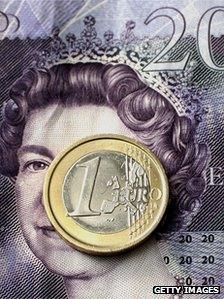
The SNP is less keen than it was for Scotland to join the euro
And no-one in Scottish or British politics is arguing that's going to be any time soon - not, at least, until the eurozone crisis is resolved.
That can only happen either by some members falling out of it, or by a more centralised set of rules being firmly applied. Or by both.
So we're back to this question of Holyrood's political leadership getting the train to Whitehall to do a deal on currency.
In exchange for financial back-up in a crisis, they're looking for joint oversight of the Bank of England, with assurances that its monetary policy is set with Scotland's interests in mind.
The case for this? Scotland has resources - oil, gas and renewable - that any Whitehall administration would want to have with its currency union.
Importing Scotland's oil
It's not immediately clear why this would be a compelling argument from Whitehall's point of view. Sure, the rest of the United Kingdom wouldn't want to increase its dependence on energy imported from other currency zones.
But it might be willing to handle that inconvenience, given there are bigger issues that might be exercising minds in London.
And if Scotland has already decided that it wants to use sterling, with or without a deal on sharing the central bank, Whitehall can assume Scotland's oil would continue to be pumped in pounds anyway. So what has it got to lose?
Nor is it clear, if the Bank of England takes on a cross-border role, how Scottish representation on the Monetary Policy Committee could out-vote the dominant element representing interests south of the border.
Scotland's groat
So here's a question: should the SNP ditch its policy in favour of sterling, and consider the option of a separate Scottish currency?
It's not just my question. It's coming from several different quarters.
On the more fundamentalist wing of nationalism, it's being asked by Jim Sillars.
The former SNP deputy leader has written for The Scotsman: "No-one needs to be an economist to understand who determines if, and upon what conditions, a currency union will come into being, and that in a relationship between five million Scots and 60 million south of the Border, the whip hands lies down there. The currency nonsense is a back-of-a-fag-packet policy."
There will be no surprise within the SNP leadership that Jim Sillars takes that view. But I hear from within the party that others are dismayed at the position on currency, as it clearly implies that London - either its government or its central bank, and probably a combination of both - would have controls over the deficit and debt being run in Edinburgh.
The search is on, below the public or media radar, for ways to move the policy on.
Tackling inequality
That's where some other voices provide more surprising insights. One of them, highlighted in The Herald this week, was from a financial analyst at AXA, and a former adviser to the Bank of England.
"An independent Scotland almost certainly means a new currency," wrote Mark Allan, because currency union through the Bank of England would "surrender almost all fiscal sovereignty to London".
From the Scotland Institute, a new think tank which is far from hostile to independence, comes the observation in recent days that if Scots are serious about tackling inequality, they won't do so while being tied to sterling.
"If independence means retaining sterling, then that independence will prelude the ability to create a genuinely different economic model," wrote the Institute's Roger Cook.
"If Scotland opts for independence, but leaves key issues such as monetary policy to Westminster (ie it retains sterling), it is implausible to see how the necessary policies [required to tackle inequalities] can be developed."
Pegged on the currency line
Another view comes from Gavin McCrone.
He's the veteran economist in the curious position of being both hero and villain to Nationalists: a hero because of a 1974 civil service memo to ministers pointing out how oil could transform Scotland's economy and hand an independent government an embarrassment of riches, but a villain because his memo remained secret for more than 30 years.
He's written another memo, this time for another think tank - the David Hume Institute. It looks at the example of Ireland, which followed independence by pegging its currency to sterling for decades.
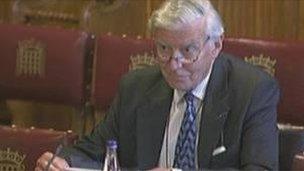
Veteran economist Gavin McCrone looked at the example of Ireland
Despite a strong consensus around the policy back then, he reflects more recent opinion within Ireland that that was profoundly damaging, and one of the factors that led to Ireland's relative stagnation while that peg remained.
"If Scotland does decide to become independent, my own view is that it would probably be best to have a separate central bank and, if it was to be given power to act as lender of last resort, a separate currency as well," writes Mr McCrone.
"This could be pegged to sterling or indeed the euro, depending on circumstances.
"Many smaller countries in Europe, where they still have their own currencies, have found that it makes sense to shadow the currency of a larger area, usually the euro.
"But this still gives them freedom, in extremis, to allow their currencies to be revalued either up or down, should the need arise; the kind of problems that are now so distressingly evident among the southern countries in the eurozone could then be avoided or at least substantially mitigated."
Pay, pension and savings
In summary, the logic coming from different quarters suggests that if independence is to be for real in Scotland, it will have to have its own currency.
So what's stopping Alex Salmond from embracing the idea?
Well, answer this one for yourself: what would it do for his poll ratings if he said that everyone's pay, savings, assets and pensions were to be denominated in a Scottish currency, as yet unknown and untested?
You can also comment or follow Douglas Fraser on Twitter: @BBCDouglsFraser
- Published6 September 2012
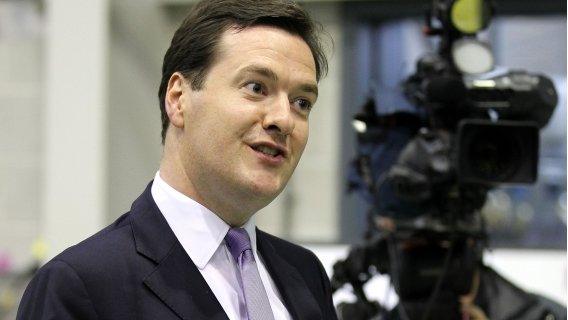
- Published10 June 2012
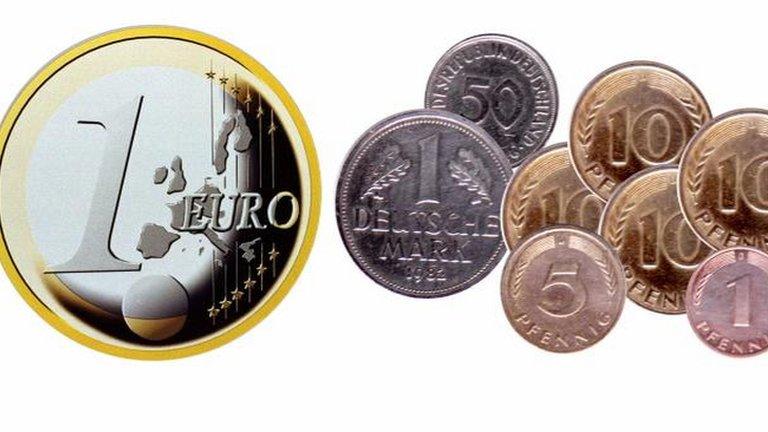
- Published3 February 2012
